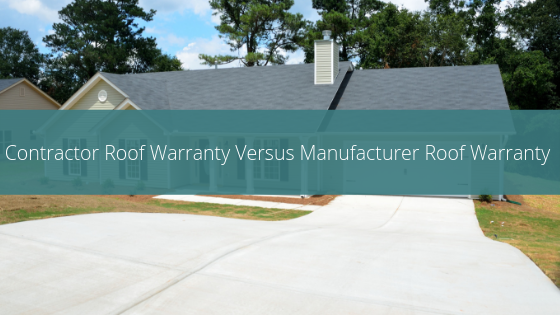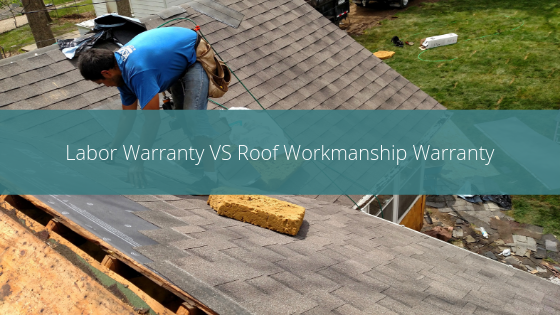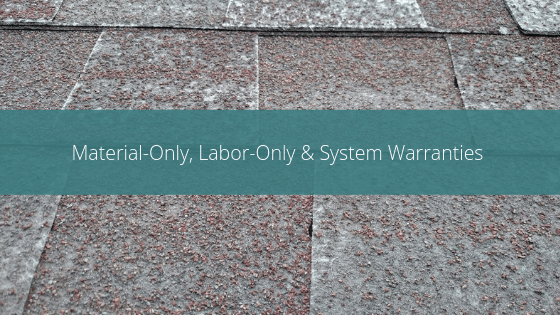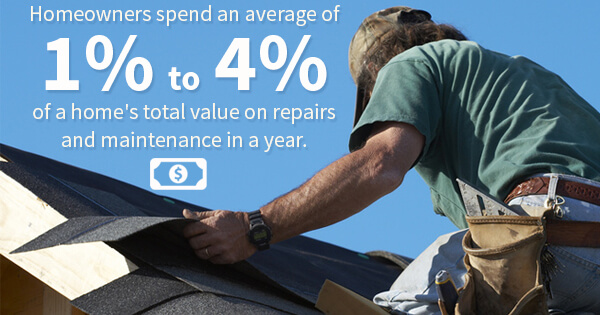Let’s try to eliminate the confusion of roof warranties. Because there are different types of buildings, different roofing materials, different climates and different installation methods, of course there will be different warranties. How do you make sure you get the one that’s right for your roof or understand your existing warranty? Let’s compare.  A contractor roof warranty comes from your contractor—the roofing company that installed your roof. A manufacturer roof warranty comes from the manufacturer of the shingles, metal, slate or other roofing material. In most cases, a contractor roof warranty only covers workmanship. For example, West Michigan Roofing stands behind our workmanship and installation, so our warranties assure you we’ll continue to do things right. Conversely, a manufacturer warranty won’t cover the installation, but it will cover all the materials. Some manufacturer warranties cover the entire roof system. As always, make sure you understand the details of any warranty before committing.
A contractor roof warranty comes from your contractor—the roofing company that installed your roof. A manufacturer roof warranty comes from the manufacturer of the shingles, metal, slate or other roofing material. In most cases, a contractor roof warranty only covers workmanship. For example, West Michigan Roofing stands behind our workmanship and installation, so our warranties assure you we’ll continue to do things right. Conversely, a manufacturer warranty won’t cover the installation, but it will cover all the materials. Some manufacturer warranties cover the entire roof system. As always, make sure you understand the details of any warranty before committing.  To explain the difference between a labor warranty and roof-workmanship warranty, we’ll reiterate that the most important feature of your new or existing roof is its installation. This is not only because a good installation gives your roof a longer life and saves you money on repairs and even utility bills, but because most roof warranties don’t protect you from a bad installation. The only one that does: a roof workmanship warranty. This type of warranty will cover you in case any issues that come up as a result of a bad installation. A labor warranty is sometimes confused with a workmanship warranty, but they’re very different. A labor warranty will cover the costs of labor to repair a roof, as long as that repair falls under the terms of the warranty. Most of the time, this does not include a problem caused by a poor installation. This is why we always stress how important a good installation is and why you should only use a professional, licensed, insured, experienced roofing contractor. Contact us to learn more.
To explain the difference between a labor warranty and roof-workmanship warranty, we’ll reiterate that the most important feature of your new or existing roof is its installation. This is not only because a good installation gives your roof a longer life and saves you money on repairs and even utility bills, but because most roof warranties don’t protect you from a bad installation. The only one that does: a roof workmanship warranty. This type of warranty will cover you in case any issues that come up as a result of a bad installation. A labor warranty is sometimes confused with a workmanship warranty, but they’re very different. A labor warranty will cover the costs of labor to repair a roof, as long as that repair falls under the terms of the warranty. Most of the time, this does not include a problem caused by a poor installation. This is why we always stress how important a good installation is and why you should only use a professional, licensed, insured, experienced roofing contractor. Contact us to learn more.  A material-only warranty will cover the cost of materials, a labor-only warranty will cover the cost of labor and a system warranty will cover the cost of both materials and labor. In a material-only warranty, your roof membrane will be covered against defects and deterioration within the warranty period, but nothing else, such as flashings or metal edges will be covered. Also, you won’t have leak-repair coverage. If you need a repair under warranty, your materials will be covered, but labor will not. The opposite is true for a labor-only warranty. In this case, the cost of labor to repair your roof will be covered, but the cost of materials will not. Most of the time, labor-only warranties come from your installer, however they are different from a workmanship warranty and won’t necessarily cover a bad installation. A full-system warranty covers materials (including flashings and other accessories) and labor and gives you the most protection against damage. Of course, it also comes with a higher cost than a material- or labor-only warranty. While it may not cover a poor installation (check the details of any warranty you’re considering), a system warranty generally will cover leak damage as well.
A material-only warranty will cover the cost of materials, a labor-only warranty will cover the cost of labor and a system warranty will cover the cost of both materials and labor. In a material-only warranty, your roof membrane will be covered against defects and deterioration within the warranty period, but nothing else, such as flashings or metal edges will be covered. Also, you won’t have leak-repair coverage. If you need a repair under warranty, your materials will be covered, but labor will not. The opposite is true for a labor-only warranty. In this case, the cost of labor to repair your roof will be covered, but the cost of materials will not. Most of the time, labor-only warranties come from your installer, however they are different from a workmanship warranty and won’t necessarily cover a bad installation. A full-system warranty covers materials (including flashings and other accessories) and labor and gives you the most protection against damage. Of course, it also comes with a higher cost than a material- or labor-only warranty. While it may not cover a poor installation (check the details of any warranty you’re considering), a system warranty generally will cover leak damage as well.
Contractor Roof Warranty Versus Manufacturer Roof Warranty
 A contractor roof warranty comes from your contractor—the roofing company that installed your roof. A manufacturer roof warranty comes from the manufacturer of the shingles, metal, slate or other roofing material. In most cases, a contractor roof warranty only covers workmanship. For example, West Michigan Roofing stands behind our workmanship and installation, so our warranties assure you we’ll continue to do things right. Conversely, a manufacturer warranty won’t cover the installation, but it will cover all the materials. Some manufacturer warranties cover the entire roof system. As always, make sure you understand the details of any warranty before committing.
A contractor roof warranty comes from your contractor—the roofing company that installed your roof. A manufacturer roof warranty comes from the manufacturer of the shingles, metal, slate or other roofing material. In most cases, a contractor roof warranty only covers workmanship. For example, West Michigan Roofing stands behind our workmanship and installation, so our warranties assure you we’ll continue to do things right. Conversely, a manufacturer warranty won’t cover the installation, but it will cover all the materials. Some manufacturer warranties cover the entire roof system. As always, make sure you understand the details of any warranty before committing. Labor Warranty Versus Roof Workmanship Warranty
 To explain the difference between a labor warranty and roof-workmanship warranty, we’ll reiterate that the most important feature of your new or existing roof is its installation. This is not only because a good installation gives your roof a longer life and saves you money on repairs and even utility bills, but because most roof warranties don’t protect you from a bad installation. The only one that does: a roof workmanship warranty. This type of warranty will cover you in case any issues that come up as a result of a bad installation. A labor warranty is sometimes confused with a workmanship warranty, but they’re very different. A labor warranty will cover the costs of labor to repair a roof, as long as that repair falls under the terms of the warranty. Most of the time, this does not include a problem caused by a poor installation. This is why we always stress how important a good installation is and why you should only use a professional, licensed, insured, experienced roofing contractor. Contact us to learn more.
To explain the difference between a labor warranty and roof-workmanship warranty, we’ll reiterate that the most important feature of your new or existing roof is its installation. This is not only because a good installation gives your roof a longer life and saves you money on repairs and even utility bills, but because most roof warranties don’t protect you from a bad installation. The only one that does: a roof workmanship warranty. This type of warranty will cover you in case any issues that come up as a result of a bad installation. A labor warranty is sometimes confused with a workmanship warranty, but they’re very different. A labor warranty will cover the costs of labor to repair a roof, as long as that repair falls under the terms of the warranty. Most of the time, this does not include a problem caused by a poor installation. This is why we always stress how important a good installation is and why you should only use a professional, licensed, insured, experienced roofing contractor. Contact us to learn more. Material-Only, Labor-Only and System Warranties
 A material-only warranty will cover the cost of materials, a labor-only warranty will cover the cost of labor and a system warranty will cover the cost of both materials and labor. In a material-only warranty, your roof membrane will be covered against defects and deterioration within the warranty period, but nothing else, such as flashings or metal edges will be covered. Also, you won’t have leak-repair coverage. If you need a repair under warranty, your materials will be covered, but labor will not. The opposite is true for a labor-only warranty. In this case, the cost of labor to repair your roof will be covered, but the cost of materials will not. Most of the time, labor-only warranties come from your installer, however they are different from a workmanship warranty and won’t necessarily cover a bad installation. A full-system warranty covers materials (including flashings and other accessories) and labor and gives you the most protection against damage. Of course, it also comes with a higher cost than a material- or labor-only warranty. While it may not cover a poor installation (check the details of any warranty you’re considering), a system warranty generally will cover leak damage as well.
A material-only warranty will cover the cost of materials, a labor-only warranty will cover the cost of labor and a system warranty will cover the cost of both materials and labor. In a material-only warranty, your roof membrane will be covered against defects and deterioration within the warranty period, but nothing else, such as flashings or metal edges will be covered. Also, you won’t have leak-repair coverage. If you need a repair under warranty, your materials will be covered, but labor will not. The opposite is true for a labor-only warranty. In this case, the cost of labor to repair your roof will be covered, but the cost of materials will not. Most of the time, labor-only warranties come from your installer, however they are different from a workmanship warranty and won’t necessarily cover a bad installation. A full-system warranty covers materials (including flashings and other accessories) and labor and gives you the most protection against damage. Of course, it also comes with a higher cost than a material- or labor-only warranty. While it may not cover a poor installation (check the details of any warranty you’re considering), a system warranty generally will cover leak damage as well.
Tags
Subscribe to West Michigan Roofing's Blog





Comments